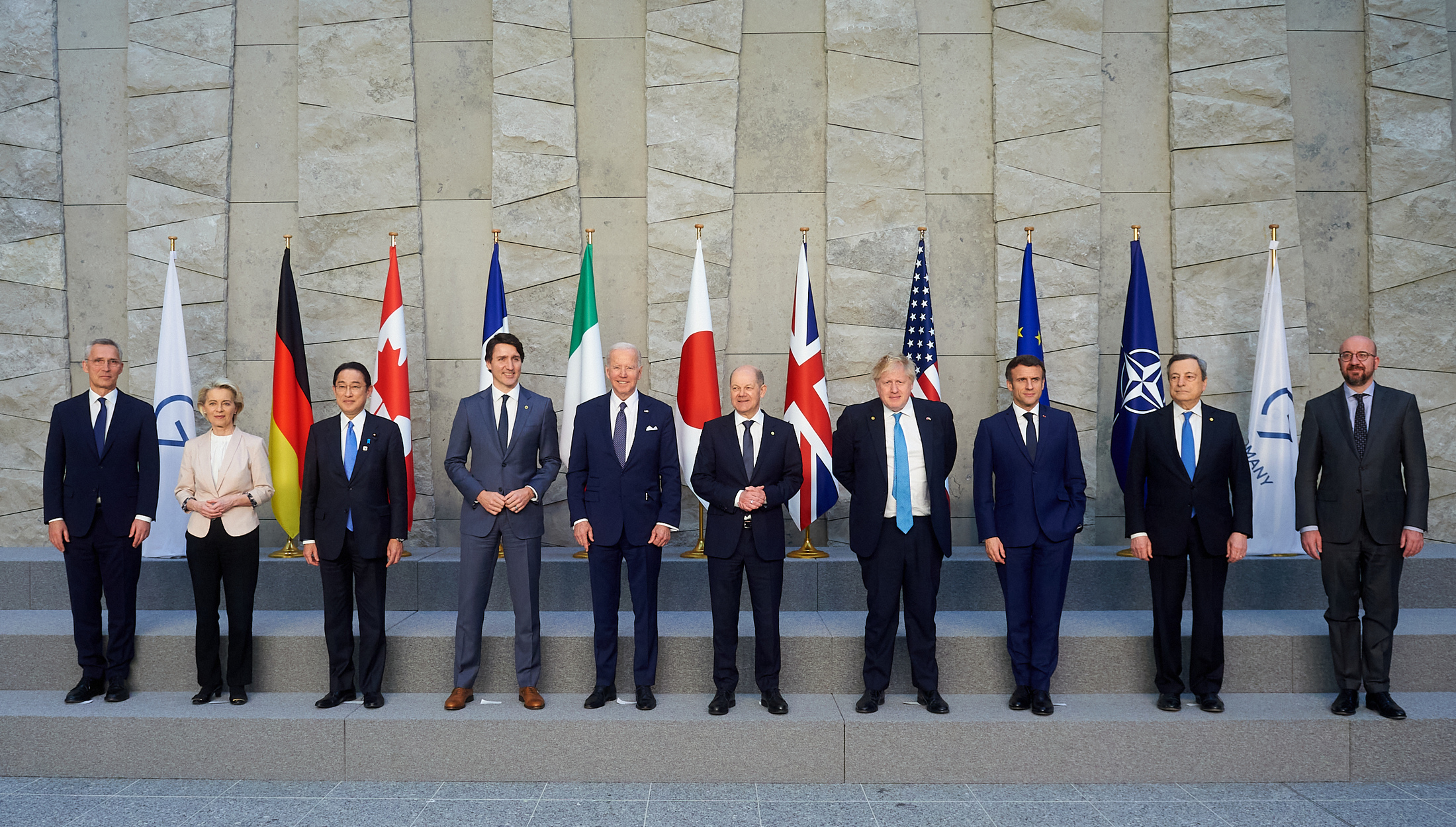KEY POINTS
- This year G7 is called upon to maintain a delicate balance between the response to the Russian invasion of Ukraine and the urgency of accelerating the pace in addressing the global climate crisis.
- Energy security should be addressed through a new priority logic by ensuring that energy efficiency and renewables come first. This will allow to calculate the real needs for diversification and avoid locking in expensive, new infrastructure and gas production that are incompatible with declining demand and 1.5°C.
- Rather than forcing the creation of a “climate club”, which risks lacking effectiveness and inclusiveness, real domestic action should focus on decarbonizing the electricity sector by 2035, following the G7 recommendations set out by the International Energy Agency, and promoting the end of the sale of light internal combustion cars and vehicles by 2035.
- To support international solidarity, the G7 should reaffirm their willingness to mobilize trillions in clean energy investments and forge new partnerships for a just energy transition. Italy needs to play a stronger role on clean energy and climate resilience, especially in countries in the Mediterranean region and Africa.
G7 countries and their allies have applied far-reaching financial sanctions in response to the Russian invasion of Ukraine. The combined impact of the war and sanctions has created serious repercussions on the world economy, with even more significant effects on developing countries and emerging economies, which have been already strongly affected by the consequences of the COVID-19 pandemic and the inflationary pressures caused by the post-pandemic recovery.
Leaders of G7 countries have demonstrated the determination and ability to make rapid and profound changes to the financial and energy system in response to the Russia’s aggression. This year G7 is called upon to maintain a delicate balance between responses to the Russian war in Ukraine and the urgency of accelerating the pace in addressing the global climate crisis.
The immediate reaction to the war toward a rapid yet complex diversification of fossil fuels indicates for now a renewed interest in traditional energy sources, particularly gas, and the dominance of a traditional concept of energy security over the urgency of responding to the threat of climate change. Although the REPowerEU package of the EU Commission is showing progress to address energy and climate security together, the opportunities offered by renewables and energy efficiency are not yet seriously considered as short-term response. What is lacking is the same priority and urgency dedicated to clean energy as for new gas infrastructure and production, despite the continued rise in gas prices significantly increases the affordability of clean energy over fossil fuels.
Energy security should be pursued in line with the principle of energy efficiency as “first fuel”, set for the first time by German G7 Presidency in 2015 and reaffirmed recently by the IEA chef Fatih Birol. Energy efficiency should be prioritized as the first course of action followed by accelerating renewable deployment and electrification. Diversification efforts in the short term should form then the third pillar to meet the residual needs. This security logic is key to avoid locking in expensive new infrastructure and gas production that are incompatible with an expected sharp decline in European gas demand (minus 40% by 2030 compared to 2021) and 1.5°C.
The German government has placed these issues at the center of its 2022 G7 Presidency. The meetings of the coming days and weeks will be crucial to understanding the extent of the G7’s successes, and its ability to keep the climate agenda among the priorities of the global major economies. On May 26-27, the Climate, Environment and Energy Ministerial will bring together G7 Ministers to define a coordinated, common response to the energy crisis, without sacrificing commitments to address the climate threat. This will be followed by the G7 Leaders’ Summit on June 26-27 in Elmau.
AMBITION
At COP26 in Glasgow, countries agreed to commit to strengthening their ambitions to align their emissions reduction targets with the Paris Agreement goalas. Based on current commitments, the planet is on a trajectory of about 2.7°C of warming, with risks of global impacts such as hurricanes, wildfires and floods, sometimes with irreversible consequences. Adding to this discouraging picture, it is yet unclear to what extent countries are willing to adopt the policies needed to meet their commitments.
The German G7 Presidency through Chancellor Scholz has promoted the idea of forming a “Climate Club” in response to the urgency of meeting climate commitments while addressing potential concerns on competitiveness associated with diverging levels of ambition among major emitting countries. The German initiative aims to promote the harmonization of mitigation policies among member countries, especially in industrial sectors where there is greatest difficulties in reducing emissions, and to employ border carbon adjustment mechanisms among participating countries along the lines of the EU CBAM.
However, serious doubts remain about (i) the real possibilities of creating such a complex mechanism in a short time between countries with significantly different economies and approaches to emissions reductions; (ii) the application of a common border carbon adjustment tool for key industry products in an already tense geopolitical and economic environment; and (iii) the modalities of participation in the “club”, which could immediately jeopardize the initiative’s chances of success. Whatever the outcome, it is very likely that the “Climate Club” will take months, if not years, to become operational, thus limiting its real contribution in the fight against climate change right away.
REAL COMMITTMENTS
The Russian invasion of Ukraine is daily accentuating the need to move the world away from fossil fuels. To reduce this dependence, the G7 should agree to increase investment in technologies using renewable energy and increasing energy efficiency, which are already widely available and highly competitive today, with the scale and urgency comparable to those with which it addresses defence spending. Building on commitments made by G7 leaders during 2021 and at COP26, in which Prime Minister Mario Draghi played a leading role, it is key for G7 countries to relaunch the G7 Partnership for Infrastructure and Investment as a framework to help reduce the infrastructure gap in emerging and developing economies. In particular, it is crucial to reaffirm the commitment to transfer trillions of dollars as in the late December 2021 G7 Leader statement that “low- and middle-income countries need to expand investment in clean energy by seven times, to more than $1 trillion per year, to address climate change.”
Building on previous commitments, G7 countries should aim to commit to:
- Phasing out coal as a domestic source of electricity generation by 2030, and decarbonize the electricity sector by 2035, in line with the pathways set out by the International Energy Agency (IEA) to achieve climate neutrality by mid-century and keep temperature rise within 1.5°C
- Setting out milestones and accountability mechanisms to eliminate fossil fuel subsidies by 2025
- Phasing out international support for all fossil fuels in developing countries, extending this commitment to multilateral development banks, and using their shareholding role in their governing boards and as major financiers of these institutions.
- Promoting the end of the sale of internal combustion cars and light vehicles by 2035, while supporting the large-scale deployment of electric vehicles and charging infrastructure.
This paradigm shift cannot happen without building a financial architecture that is strongly geared to support a clean global energy transition, in which public banks, including central banks and international financial institutions, use their respective tools and resources to accelerate the decarbonization agenda, consolidating signals to the market about available development and business opportunities.
INTERNATIONAL SOLIDARITY
The contribution of G7 countries alone will not be sufficient to provide an adequate response to climate change: international cooperation is and will be increasingly critical to charting a path that keeps the global temperature rise within 1.5°C. It is now clear that decarbonizing the electricity sector and accelerating the shift away from coal toward renewables in large emerging economies, such as India, Indonesia, and Vietnam, is the best option for both a just transition and energy security, as well as a necessary step in efforts to meet Paris goals. South Africa’s Just Transition Partnership announced at COP26 to shift the country away from coal could become a viable model for other developing countries and international financial institution, with great potential for replicability in other countries intent on initiating a just energy transition.
Building on this opportunity, the G7 should jointly announce new Just Energy Transition Partnerships (JET-Ps) led by major emerging economies and calibrated to their development, climate and social priorities. It is crucial that JET-Ps are sufficiently agile platforms to achieve radical changes in energy infrastructure in a short timeframe and be supported by the necessary public and private financing. The biggest risk at the moment is that they become new unfulfilled promise by developed countries. Italy can and must play a stronger role as a potential contributor to existing partnerships and as leading contributor to new ones, especially in countries in the Mediterranean region and Africa.
These deals are not only imperative to drastically reduce emissions in line with what science suggests, but they are also priority tools by which developed countries can end their international fossil fuel financing without impacting the stability of emerging economies.
In a year marked by the likely decline of the G20 as a multilateral forum able to address systemic, global challenges, the leadership of the G7 – and its renewed collaboration with major emerging economies – is more needed than ever. The G7 remains a key forum for driving ambitious climate action ahead of next November COP27 in Egypt and, more broadly, toward the global goals that need to be met in this critical decade to keep 1.5 alive.
Photo credit NATO






